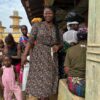RHCI collaborates with the Gillings UNC School of Public Health
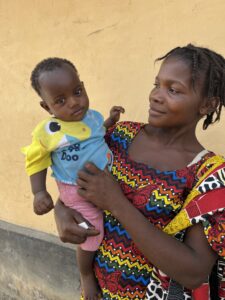
The Rural Health Care Initiative (RHCI) and University of North Carolina (UNC) collaboration, began in early 2021, focusing on the evaluation of RHCI’s programs benefiting mothers and children in a country with one of the world’s highest rates of maternal and child mortality, Sierra Leone. The goal of this collaboration is to determine how well RHCI’s programs are operating and to look for opportunities for improvement. One focus of the evaluation was on the child malnutrition program offered by RHCI to children under age 5. Furthermore, three more evaluations included the Maternity Waiting Homes, mobile outreach clinics, and stakeholder interviews. These extensive evaluations and results allow for RHCI’s programs to be adjusted as needed to ensure quality lifesaving care is given to the mothers and children we serve.
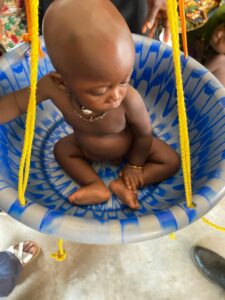
Baby being weighed to evaluate improvement of malnutrition
The RHCI Child Malnutrition Program was a major focus and began with a literature review on ways to improve it. The UNC staff and graduate students provided valuable information and experience on WHO guidelines working with our team and the RHCI nutritionist in Sierra Leone to implement improvements. This included adding a second visit each month for every malnourished child, providing more educational materials to the nutritionist to use, sending children to the hospital for evaluation who are not improving, and making plans for training the community health workers (CHWs) in malnutrition. The first training of 77 CHWs from approximately 50 villages took place over three days at the end of May in 2022, with an addition 24 community leaders and stakeholders participating.
The Maternity Waiting Home evaluations performed at RHCI’s 24-bed and 11-bed facilities revealed the primary reason women chose to stay at the Homes is to increase their chance of having a safe delivery and being well-nourished. Knowingly, RHCI is dramatically reducing maternal deaths in the Chiefdom because of the Homes. According to the evaluation, there is an opportunity to improve nutrition at the Home by adding more nutritious foods to the meals given to the expectant mothers, which has now been improved upon in collaboration with RHCI’s Nutritionist. Additionally, the evaluation exposed other areas of opportunities for improvement which have been undertaken including increasing transportation availability for patients, education, and social skills/activities.
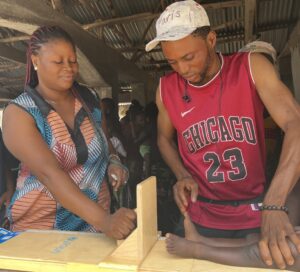
Nutritionist, Umu Shour measuring height of child
The evaluation of RHCI’s mobile outreach clinic provided a great deal of insight and guidance to our staff and medical professionals. Areas of need reflected in the evaluation included medical treatment for all adults, bringing clinics to more villages, transportation assistance, and providing food for more people. Although RHCI does cannot currently undertake each of these needs at this time, it has made major program adjustments as a result. The evaluation results showed a tremendous need to provide medical services from infant to five years old, to increase through ten years old. Taking into serious consideration of the evaluation results, in July 2022, RHCI expanded its mobile outreach clinic services to include children through the age of ten. RHCI is now reaching even more children to provide lifesaving care.
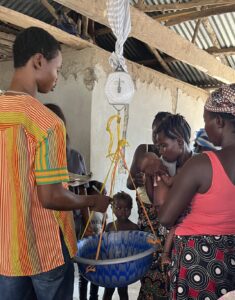
Mother brings baby to be weighed at Outreach Clinic
Stakeholder interviews included local health care workers, community leaders, and beneficiaries. The analysis of these interviews revealed that RHCI’s Maternity Waiting Homes and the mobile outreach clinics are the two most important services offered by RHCI. The number one service they felt that was most urgently needed was providing medical care to children age 5 and older, which is being implemented. Many other needs were revealed, including the need for more trained health professionals, improved transportation to get to clinics or hospitals, treatment for adults, improved nutrition and food available, lack of medication, and poverty in general. In many of the comments, the interviewees expressed their utmost gratitude to RHCI for its service in the Tikonko Chiefdom.
In summary, as a small NGO, RHCI found the collaboration invaluable and hopes to continue with further work on program evaluations with the expertise of the UNC team, which included Sheila Leatherman, Leslie Lytle, Maggie Holly, and Doreen Alumaya. The RHCI Minnesota-based team, including Julie Hoffer and Carol Nelson, is grateful for this opportunity and the impact it is making on RHCI’s Sierra Leone programs.
The Gillings Humanitarian Health Initiative at UNC is an effort to increase UNC’s impact on global health equity with the collective efforts of faculty and students through research; awareness building and education; capacity building and technical support to countries and non-governmental organizations (NGOs); engagement and service projects; and advocacy and influencing of policy and practice.

